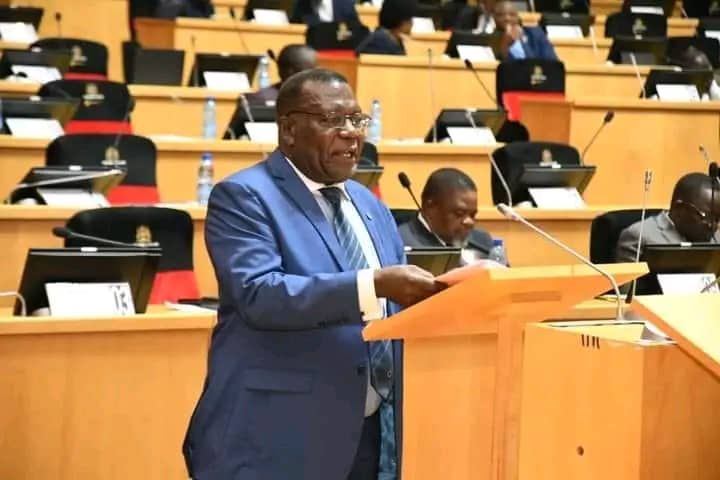By Burnett Munthali
Leader of Opposition Dr. George Chaponda recently expressed deep frustration over the continued silence from the Minister of Finance regarding critical inquiries into the status of Malawi’s engagement with the International Monetary Fund (IMF) and its Extended Credit Facility (ECF). Malawi’s national debt, which has now ballooned to over 16 trillion Kwacha, has left many citizens and leaders concerned about the country’s economic future, prompting Chaponda’s urgent appeal for transparency and accountability.
In an impassioned address to Parliament, Dr. Chaponda made it clear that his multiple inquiries into the status of the ECF and Malawi’s broader economic strategy have been consistently ignored by the Ministry of Finance. The lack of response, according to the opposition leader, is deeply frustrating, unfair, and indicative of incompetence within the government.

The Debt Crisis and the IMF’s Extended Credit Facility
At the core of Chaponda’s petition is the dire need for clarity on the status of Malawi’s relationship with the IMF, specifically regarding the Extended Credit Facility (ECF). The ECF is crucial for Malawi as it provides financial assistance to low-income countries facing significant economic challenges. Given the country’s mounting debt, exceeding 16 trillion Kwacha, Malawi is in a precarious economic situation that requires careful management and strategic financial support.
Dr. Chaponda’s persistent inquiries to the Minister of Finance aim to uncover how Malawi intends to navigate the ECF, which would potentially offer much-needed relief and economic stability. However, the absence of any official communication from the Ministry has only heightened concerns about the government’s ability to effectively manage the debt crisis.
“This silence is not just frustrating; it is a disservice to the Malawian people,” Chaponda said. “We deserve to know the steps being taken to safeguard our economic future, and it is unfair to leave these questions unanswered when so much is at stake.”
Unanswered Questions on the Tragic Plane Crash Investigation
In addition to the economic concerns, Dr. Chaponda invoked Standing Order 69, seeking a parliamentary discussion on the preliminary report from the German Federal Bureau of Aircraft Accident Investigation (BFU). The report pertains to the tragic plane crash that claimed the lives of former Vice President Dr. Saulosi Klaus Chilima and eight others, an event that sent shockwaves across the nation.
Dr. Chaponda highlighted the importance of transparency and public accountability in this matter, emphasizing the need for a thorough investigation into the causes of the crash. Yet, his request for a parliamentary debate on the BFU’s preliminary findings has gone unanswered, much like his inquiries about the ECF.
“The families of the victims, and the nation as a whole, deserve answers,” Chaponda stated. “It is deeply troubling that a tragedy of this magnitude has not been properly addressed within Parliament, and the silence on this issue only adds to the public’s grief.”
A Call for a Business Committee Meeting Ignored
Dr. Chaponda’s frustrations culminated when his request for a business committee meeting was disregarded by the Speaker of Parliament. The meeting, which Chaponda saw as an essential part of his duties as a political leader, was intended to address two critical issues: the reinstatement of a private member’s motion regarding alternative forms of identification for voter registration, and a petition from concerned citizens and the Economic Freedom Movement on the national identity card registration process.
The motion on alternative voter identification seeks to alleviate challenges many Malawians face in acquiring national IDs, a prerequisite for voter registration. With national elections on the horizon, ensuring that all eligible voters can participate in the democratic process is a priority for many in Parliament, including Chaponda. The failure to hold a business committee meeting to address these pressing issues only deepens the concern about the state of governance in Malawi.
“My frustration has reached its peak,” Dr. Chaponda remarked, “We are supposed to be the voices of the people, yet critical discussions are being ignored. The failure to meet our responsibilities as leaders in this house is unacceptable.”
The Broader Implications for Malawi’s Governance
Dr. George Chaponda’s petitions and the resulting silence from both the Ministry of Finance and the Speaker of Parliament raise serious questions about governance in Malawi. The lack of transparency on both economic and safety issues could have far-reaching consequences for public trust in government institutions.
Chaponda’s insistence on addressing the growing national debt crisis and the investigation into Dr. Chilima’s tragic death reflects the urgent need for accountability in the highest levels of government. The absence of responses to these critical issues could signal a lack of competence or a deliberate attempt to avoid public scrutiny. Either way, the people of Malawi deserve better.
In conclusion, Dr. George Chaponda’s recent address to Parliament highlights the challenges Malawi faces in terms of economic stability, transparency, and public safety. With a national debt exceeding 16 trillion Kwacha and no clear communication from the government on the IMF’s Extended Credit Facility, the economic future remains uncertain. Similarly, the unanswered requests for discussions on the tragic plane crash that claimed the life of Dr. Saulosi Klaus Chilima and the disregard for a business committee meeting signal deeper issues within Malawi’s political leadership.
As the nation grapples with these unresolved matters, Dr. Chaponda’s frustrations reflect the broader concerns of the Malawian people, who are calling for answers, accountability, and a government that acts in their best interests.
_Burnett Munthali is a political analyst and writer focused on governance, economic development, and current affairs in Malawi and the region._


